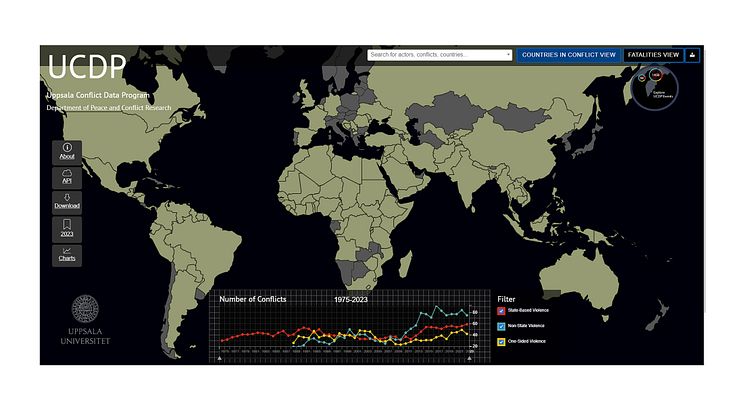Press release -
UCDP peace researchers: Was 2017 the end of IS?
When peace researchers at Uppsala Conflict Data Program (UCDP) summarize the conflict situation for the world in 2017, much focus is on the so-called Islamic State, IS. During the year, both Iraq and Syria claimed that IS had been defeated.
IS used to control an area the size of Portugal, but by the end of 2017 the group had lost control of almost all of its territory. Now they are confined to only a few pockets of territory along the Iraqi-Syrian border.
Does the weakening of IS mean that the trend of large numbers of battle-related deaths in the world is ending?
“Even though the number of fatalities incurred in Syria is decreasing for the third consecutive year, the number of battle-related deaths in the world is still on a very high level compared to the post-Cold War period,” says Therése Pettersson, Project Manager at UCDP.
“Although IS has lost its strongholds in Iraq and Syria, the group is likely to continue its activities in other parts of the world, such as Afghanistan, West Africa, and South East Asia. Also, attacks on civilian targets around the world will probably continue,”
Moreover, IS is only one of hundreds of groups fighting in Syria, and even if the group was defeated, this would not automatically mean peace in Syria. Six years of civil war have resulted in a myriad of groups fighting against President Assad’s government, but also against each other in so-called non-state conflicts. In addition to the many Syrian opposition groups, there are several states also supporting different parties to the conflict. The involvement of countries such as the USA, Russia, and Turkey complicates an already complex situation.
2017 has been a violent year for many countries in the world.
"If we look beyond Syria and Iraq, we observe worrying situations in countries like the Democratic Republic of Congo, Myanmar, Central African Republic and Yemen, with thousands of civilian casualties,” says Therése Pettersson.
In Myanmar, thousands of people from the Rohingya minority have been killed and hundreds of thousands are refugees. Yemen, a country that for many years has been ravaged by an almost forgotten civil war, has during the year been referred to as the world’s worst humanitarian crisis by the UN.
Although 2017 was a violent year, the number of wars - conflicts resulting in at least 1000 battle-related deaths - has decreased somewhat compared to 2016.
“Other positive news is that the peace agreement with FARC in Colombia seems to be holding, and talks have also been held with the second largest rebel group, ELN. Finding a peaceful solution to the conflict in Colombia means that a conflict that has been ongoing for more than 50 years and has caused tens of thousands of fatalities, is coming to an end,” says Therése Pettersson.
For more information, please contact:
Therése Pettersson, Project Leader at Uppsala Conflict Data Program (UCDP), Uppsala University, therese.pettersson@pcr.uu.se, phone: +46706496491.
Topics
Uppsala University -- quality, knowledge, and creativity since 1477
World-class research and outstanding education of global benefit to society, business, and culture.
Uppsala University is one of northern Europe's highest ranked academic institutions. www.uu.se

